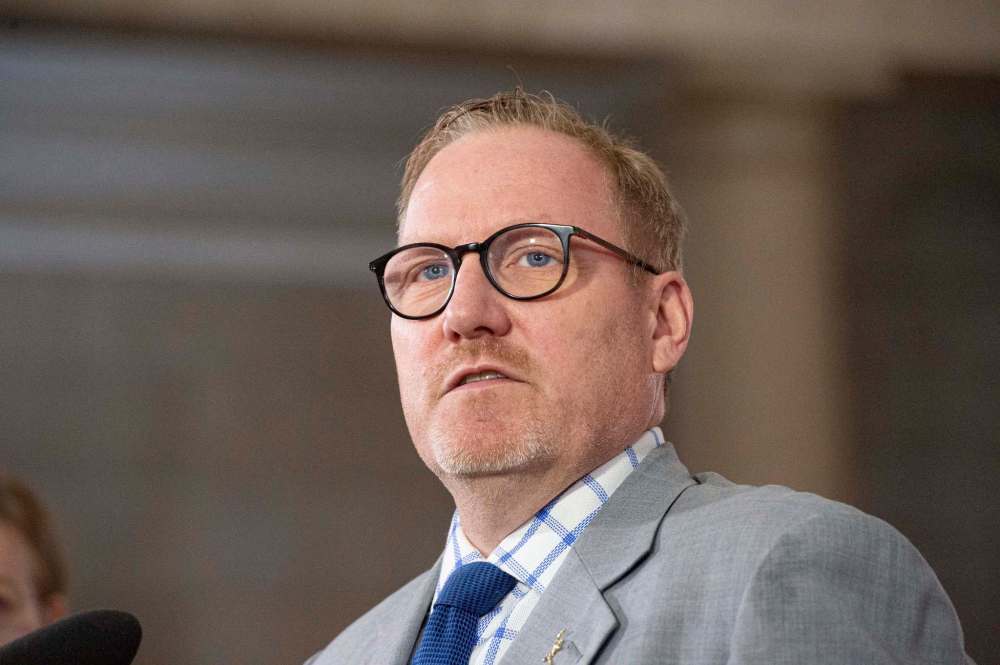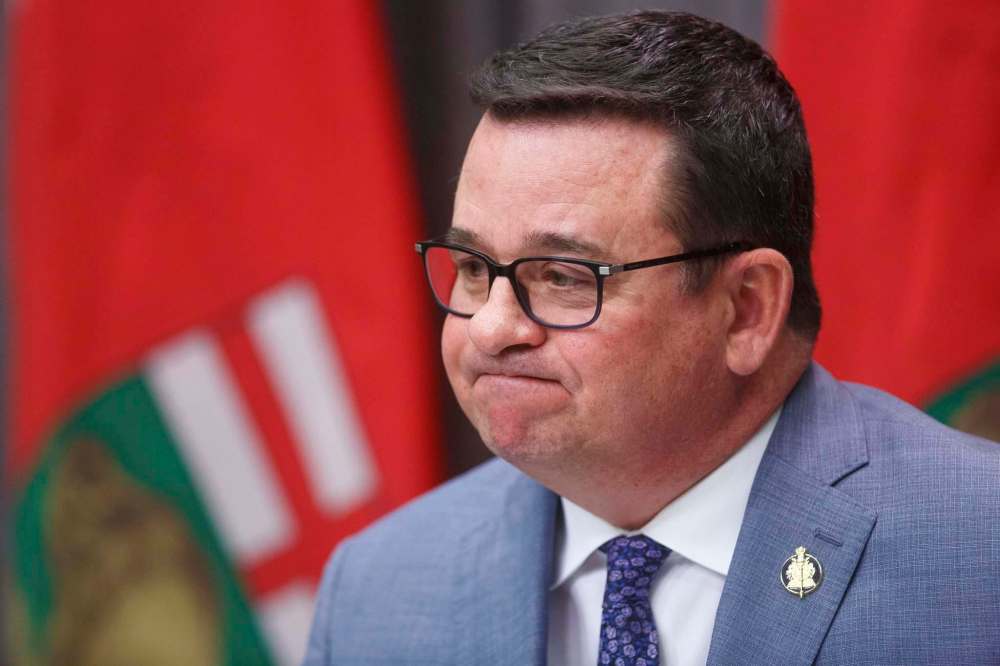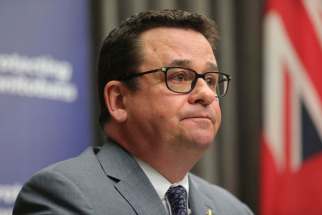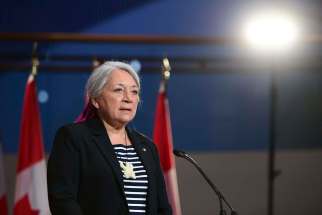Province plans three years of 2.5% Hydro rate hikes Prices should be set by Public Utilities Board, not decided around cabinet table, say critics
Read this article for free:
or
Already have an account? Log in here »
To continue reading, please subscribe:
Monthly Digital Subscription
$0 for the first 4 weeks*
- Enjoy unlimited reading on winnipegfreepress.com
- Read the E-Edition, our digital replica newspaper
- Access News Break, our award-winning app
- Play interactive puzzles
*No charge for 4 weeks then price increases to the regular rate of $19.00 plus GST every four weeks. Offer available to new and qualified returning subscribers only. Cancel any time.
Monthly Digital Subscription
$4.75/week*
- Enjoy unlimited reading on winnipegfreepress.com
- Read the E-Edition, our digital replica newspaper
- Access News Break, our award-winning app
- Play interactive puzzles
*Billed as $19 plus GST every four weeks. Cancel any time.
To continue reading, please subscribe:
Add Free Press access to your Brandon Sun subscription for only an additional
$1 for the first 4 weeks*
*Your next subscription payment will increase by $1.00 and you will be charged $16.99 plus GST for four weeks. After four weeks, your payment will increase to $23.99 plus GST every four weeks.
Read unlimited articles for free today:
or
Already have an account? Log in here »
Hey there, time traveller!
This article was published 08/07/2021 (1614 days ago), so information in it may no longer be current.
THE Pallister government is planning three years of Hydro rate increases without any oversight by the Public Utilities Board.
It plans to increase rates by 2.5 per cent on Dec. 1 this year and again in 2022 and 2023, costing the average household about $35 per year.
It will be the second rate increase in less than a year imposed by cabinet using legislation rather than through a review by the independent regulator legislated to oversee public utility rates.
Critics warn that it’s a political power grab that leaves Manitobans in the dark about the rates they pay to the utility they own.

At a press conference Thursday, Finance Minister Scott Fielding said the annual 2.5 per cent increase will be included in an amendment to Bill 35 — The Public Utilities Ratepayer Protection and Regulatory Reform Act — expected to pass in the fall. It would see the Public Utilities Board set rates every five years, starting in 2024. Until then, rate-setting would be left up to the provincial cabinet.
“These interim rates will be approved by the legislative assembly so all members of the legislature will be able to debate and vote on this rate and that’s really important,” said Fielding, whose government holds a majority of seats, thereby guaranteeing its passage.
Fielding said that it will save ratepayers $40 million not having to go through Public Utilities Board rate hearings over a five-year period.
“These interim rates will be approved by the legislative assembly so all members of the legislature will be able to debate and vote on this rate and that’s really important.”
– Finance Minister Scott Fielding
Critics say the PUB has saved Hydro customers much more than it has cost them, and question how the province arrived at the 2.5 per cent increase.
“The legislation that the PCs are planning on pushing through this fall will essentially remove the role of the Public Utilities Board as an independent reviewer of rate-setting on an ongoing basis,” said Adrien Sala, NDP critic for Manitoba Hydro Adrien Sala.
“That guarantees that Manitobans will be exposed to the potential for overpaying for electricity year after year after year. Hydro rates should be set through an independent process, not at the cabinet table, not by legislators through debate.”
And his NDP caucus colleague Ian Bushie, critic for Indigenous affairs, issued a statement later in the day, decrying the plan to impose a third rate increase in just over a year on First Nations reserves.
“Once this latest rate hike goes through, the PCs will have increased hydro rates by nearly 12 per cent during a pandemic,” Bushie’s statement said.
“This kind of rate shock is damaging to our communities and our economy and will make it harder for First Nations to recover from the pandemic. If the PCs want to work towards advancing reconciliation, they need to listen to our First Nations communities and work towards making life affordable for Indigenous peoples living on reserve. Hiking hydro rates on reserve contradicts any type of reconciliation.”
The Pallister government frequently blames the former NDP government for Hydro’s financial issues — particularly the mismanagement of the Bipole III and Keeyask construction megaprojects — but has obscured data on revenue from them.
“Once this latest rate hike goes through, the PCs will have increased hydro rates by nearly 12 per cent during a pandemic.”
– NDP critic for Indigenous affairs, Ian Bushie
At Thursday’s news conference, Crown Services Minister Jeff Wharton pointed out that the proposed 2.5 per cent rate increase will amount to the lowest rate hikes in recent history, and that it’s less than the 3.5 per cent increase Manitoba Hydro wanted to see this fall.
“It balances the need for Manitoba Hydro to repay their massive debts created by the former government’s reckless mismanagement and keeps our electricity rates among the lowest in North America,” Wharton said.

A member of the Consumers Coalition of Hydro customers says it’s concerned that the province can’t explain in detail its justification for a 2.5 per cent annual rate hike.
“We have no idea if this amount (2.5 per cent) is too low or too high, as we do not have the background information necessary to make that determination,” said Gloria Desorcy, executive director of the Consumers Association of Canada (Manitoba). The coalition has urged the PUB to order a rate review of Manitoba Hydro, which has failed to provide the financial forecast the board ordered, saying it is still working on it.
Desorcy said if the rate is too low, and if Bill 35 passes, the PUB will be forced to set rates at double the rate of inflation for years to come following the three-year period of annual 2.5 per cent rate increases.
“It balances the need for Manitoba Hydro to repay their massive debts created by the former government’s reckless mismanagement and keeps our electricity rates among the lowest in North America.”
– Crown Services Minister Jeff Wharton
She said the rate hearings conducted by the quasi-judicial tribunal have saved Manitobans more than they’ve cost and her association can prove it.
It commissioned a 2020 report by William Harper, a former Ontario Hydro employee with 35 years experience in the design of rates and the regulation of electricity, to look at the annual cost of electricity proceedings in Manitoba.
His findings determined they average closer to $4 million most years — not the nearly $10 million a year the provincial government claims.
The cost of the rate hearings works out to about $2.50 per year based on the average Winnipeg electricity customer, using about 1,000 kilowatt hours per month, the report found. The report also determined that PUB hearings have saved the average Winnipeg electricity customer $50 per year.
The Pallister government is putting Hydro’s financial future at risk by “fixing” prices to try to buy some political popularity, Liberal Leader Dougald Lamont said.
“Hydro’s rates should be set by the PUB after public hearings, not figured out on the back of a napkin in the premier’s office,” Lamont said.
“The actual price the (Progressive Conservatives) have picked has nothing to do with Hydro’s future needs.”
— With files from Dylan Robertson.
carol.sanders@freepress.mb.ca

Our newsroom depends on a growing audience of readers to power our journalism. If you are not a paid reader, please consider becoming a subscriber.
Our newsroom depends on its audience of readers to power our journalism. Thank you for your support.
History
Updated on Thursday, July 8, 2021 1:30 PM CDT: Headline updated.
Updated on Thursday, July 8, 2021 6:52 PM CDT: updates earlier webbie to final version
Updated on Thursday, July 8, 2021 7:00 PM CDT: Adds formatting, photos.
Updated on Friday, July 9, 2021 10:27 AM CDT: Corrects gender reference.










